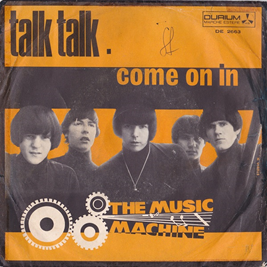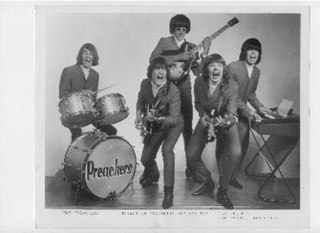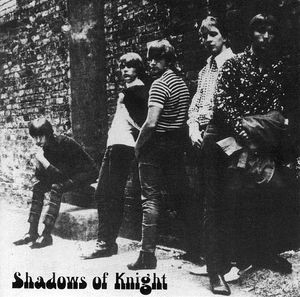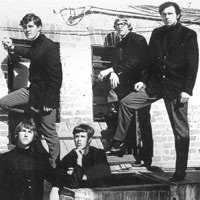Garage rock is a raw and energetic style of rock and roll that flourished in the mid-1960s, most notably in the United States and Canada, and has experienced a series of subsequent revivals. The style is characterized by basic chord structures played on electric guitars and other instruments, sometimes distorted through a fuzzbox, as well as often unsophisticated and occasionally aggressive lyrics and delivery. Its name derives from the perception that groups were often made up of young amateurs who rehearsed in the family garage, although many were professional.

The Shadows of Knight were an American rock band from Chicago, Illinois, that played a version of British blues influenced by their native city. When they began recording in 1965, the band's self-description was "the Stones, Animals and the Yardbirds took the Chicago blues and gave it an English interpretation. We've taken the English version of the Blues and re-added a Chicago touch," to which rock critic Richie Unterberger commented: "The Shadows of Knight's self-description was fairly accurate."

The Chocolate Watchband is an American garage rock band that formed in 1965 in Los Altos, California. The band went through several lineup changes during its existence. Combining psychedelic and garage rock components, their sound was marked by David Aguilar's lead vocals, songwriting, as well as proto-punk musical arrangements. The band's rebellious musical posture made them one of the harder-edged groups of the period with many critics labeling them as America's answer to the Rolling Stones.

The West Coast Pop Art Experimental Band (WCPAEB) was an American psychedelic rock band formed in Los Angeles, California, in 1965. The group created music that possessed an eerie, and at times sinister atmosphere, and contained material that was bluntly political, childlike, and bizarre. Representing different musical backgrounds among band members, the group, at times, resembled a traditional Byrds-esque folk rock ensemble, but the WCPAEB also, within the same body of work, recorded avant-garde music marked by multi-layered vocal harmonies.
The Choir was a garage rock band largely active in the greater Cleveland area from the mid-1960s into the early 1970s. Originally called The Mods, their largest commercial success came with the release of their first single "It's Cold Outside" in December 1966. The song, considered to be a classic of the garage rock era, was featured on Pebbles, Volume 2, one of the earlier garage rock compilation LPs. The flipside, "I'm Going Home" was included as a bonus track when the Pebbles album was reissued as a CD, and it can also be found on a garage rock compilation LP on Ohio bands, Highs in the Mid-Sixties, Volume 9. The Choir is well known for containing three of the four original members of Raspberries.

The Rising Storm is an American rock group that was active at Phillips Academy in Andover, Massachusetts, United States, between 1965 and 1967. Their music is considered to belong in the folk rock and garage rock genres. The original members of the group were Bob Cohan (guitar), Todd Cohen (bass), Charlie Rockwell (keyboards), Tom Scheft (drums), Tony Thompson, and Rich Weinberg.

New Colony Six is an American garage and later soft rock band from Chicago, formed in 1964. Original members were Ray Graffia Jr. (vocals), who was born March 28, 1946; Chic James (drums); Pat McBride (harmonica); Craig Kemp (organ); Wally Kemp (bass); and Gerry Van Kollenburg (guitar), who was born June 26, 1946. Ronnie Rice replaced Craig Kemp in 1966. There were numerous changes in the lineup over the years. Richie Unterberger characterized the group's sound as "a poppier American Them with their prominent organ, wobbly Lesley-fied guitar amplifications, and rave-up tempos", later devolving into "a cabaret-ish band with minor national hits to their credit by the end of the 1960s." Like Paul Revere & the Raiders - with whom NC6 shared a two-flat before either band hit the charts or knew that the other had nearly identical stage wear, they wore colonial outfits on stage.
Not to be confused with Styx (band)

"Talk Talk" is the debut single of American garage rock band the Music Machine. It was released in November 1966, and produced the band's only Top 20 hit on the Billboard Hot 100. The song was included on their debut album, (Turn On) The Music Machine.

Ignition is a compilation album by the American garage rock band, The Music Machine, and was released on June 27, 2000 on Sundazed Records. It includes an assortment of rare singles, outtakes, and previously unreleased material spanning from when the group went under the moniker, the Raggamuffins, in 1965, to their disbandment in 1969. The Raggamuffins were a folk rock trio led by Sean Bonniwell, and the prototype group that developed an experimental hard-edge sound, before recruiting two additional members and becoming the Music Machine. By 1969, all the original members, except Bonniwell, departed the group, which was then known as the Bonniwell Music Machine. Though the band would no longer produce hits, such as "Talk Talk" and "The People In Me", it was Bonniwell's most ambitious recording period as he incorporated elements of psychedelia and pop rock into the group's music.

The Bonniwell Music Machine is the second and final album by the American garage rock band The Music Machine, recorded under the renamed moniker The Bonniwell Music Machine, and released on Warner Bros. Records on February 10, 1968. As with their debut LP, the album again saw the band blending garage and psychedelic rock influences, albeit with a greater emphasis on psychedelia than on their previous album release. Prior to completing its recording, all of the group's original members, except for its creative force, Sean Bonniwell, departed, though they would still appear on some of the album's tracks.

The Banshees were an American garage rock band formed in Chicago, Illinois, in 1966. The group is best remembered for its sole single, featuring the dissonant proto-punk anthem, "Project Blue". The song has become a classic of the musical genre of garage rock and is featured prominently on several compilation albums.

The Preachers were an American garage rock band formed in Los Angeles, California, in 1964. Musically, the group took an intense, and pounding musical approach that was heavily influenced by the British Invasion groups, particularly the Rolling Stones and the Dave Clark Five, and their take on American R&B. In their brief recording career, the Preachers released three singles, with their most acclaimed recording being a high-energy rendition of Bo Diddley's, "Who Do You Love?".

"Action Woman" is a song by the American garage rock band the Litter, written by their record producer Warren Kendrick, and first released as the group's debut single on Scotty Records in January 1967. The song also appeared on the band's first album Distortions. Although "Action Woman" never broke out on the national charts, it is now revered as a classic piece of the musical genre of garage rock. Accordingly, the composition has appeared on several compilation albums – most famously as the opening track on Pebbles, Volume 1, incorporating a skip in the recording – and has been the subject of cover versions.

"It's Cold Outside" is a song by the American garage rock band the Choir, written by member Dann Klawon, and first released on Canadian-American Records in September 1966. It was later re-released in 1967 on Roulette, with Dann's last name incorrectly spelled "Klawson". The song is considered a classic of the musical genre of garage rock, and became the group's only national hit. The song has since been featured on several compilation albums. At the time of the recording, the band consisted of: Wally Bryson - lead guitar, Dave Smalley - guitar/vocals, Dave Burke - bass, Jim Bonfanti - drums, and Dann Klawon - multiple instruments/vocals. The group changed members over the years, but Bryson, Smalley and Bonfanti would team up with songwriter Eric Carmen a few years later, and form the power pop group Raspberries.

Raw 'n' Alive at the Cellar, Chicago 1966! is a live album by the American garage rock band the Shadows of Knight, and was released on Sundazed Records in 1992. The album consists of recordings from the band's appearance at the Cellar in Arlington Heights, Illinois in December 1966. Although the tapes were never anticipated to be released publicly, Raw 'n' Alive at the Cellar is commended for its good sound quality, and represents one of the better live concert recordings to emerge from the garage rock era.

Oh Yeah! The Best of Dunwich Records is a garage rock compilation issued by Sundazed Records featuring music made by acts who recorded for Dunwich Records in Chicago during the 1960s. Dunwich quickly became one of the top independent labels in Chicago and, with national distribution through Atco Records, enjoyed hits by artists such as the American Breed and the Shadows of Knight, who were some of the best-known acts in garage rock, and are included here, along with the Del-Vetts, another well-known act. The set represents the stylistic diversity of the genre, featuring cuts that range from harder-edged and blues-based numbers to more pop-oriented fare. Some of the tracks display folk rock and psychedelic influences and there are a few advertising jingles, which appeared local radio stations, as well as an interview with the Shadows of Knight thrown in for good measure. The packaging includes thorough and we-researched liner notes by Jeff Jarema that provide information for the acts and their songs.

The Kreeg were an American garage rock band from Albuquerque, New Mexico who were active in the 1960s. They were one of the most popular groups in the Albuquerque area and enjoyed local hits from both sides of their 1966 single "How Can I" b/w "Impressin'". Their work has come to the attention of garage rock enthusiasts with the release of the 1996 anthology Impressin', which features their complete recordings.

The E-Types were an American garage rock band formed in Salinas, California, in 1965. The group's sound combined striking three-part vocal harmonies and Jody Wence's jangling keyboards, with professional production techniques that were outside of the garage band norm. During the E-Types' recording career, the band released five singles, including their most notable record "Put the Clock Back on the Wall". Although the band was short-lived, the E-Types had a profound presence in San Francisco's live scene and, years after their disbandment, the group recorded a reunion album.

Distortions is the debut studio album by American psychedelic and garage rock band the Litter. It was released on May 1, 1967, by Warick Records and includes the single "Action Woman".

















